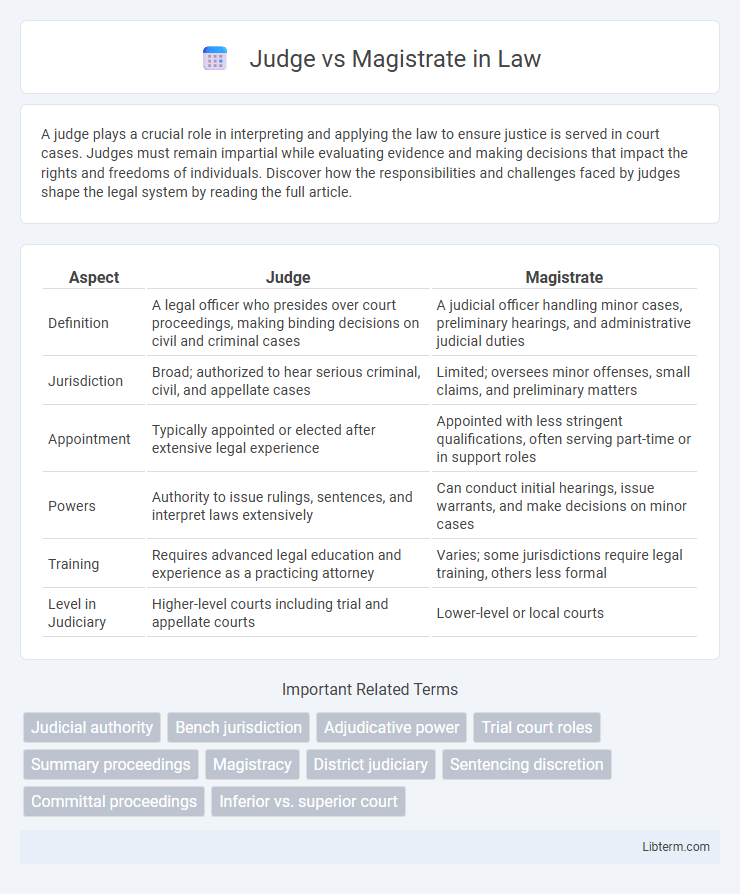A judge plays a crucial role in interpreting and applying the law to ensure justice is served in court cases. Judges must remain impartial while evaluating evidence and making decisions that impact the rights and freedoms of individuals. Discover how the responsibilities and challenges faced by judges shape the legal system by reading the full article.
Table of Comparison
| Aspect | Judge | Magistrate |
|---|---|---|
| Definition | A legal officer who presides over court proceedings, making binding decisions on civil and criminal cases | A judicial officer handling minor cases, preliminary hearings, and administrative judicial duties |
| Jurisdiction | Broad; authorized to hear serious criminal, civil, and appellate cases | Limited; oversees minor offenses, small claims, and preliminary matters |
| Appointment | Typically appointed or elected after extensive legal experience | Appointed with less stringent qualifications, often serving part-time or in support roles |
| Powers | Authority to issue rulings, sentences, and interpret laws extensively | Can conduct initial hearings, issue warrants, and make decisions on minor cases |
| Training | Requires advanced legal education and experience as a practicing attorney | Varies; some jurisdictions require legal training, others less formal |
| Level in Judiciary | Higher-level courts including trial and appellate courts | Lower-level or local courts |
Understanding Judicial Roles: Judge vs Magistrate
Judges preside over higher courts with authority to rule on a wide range of civil and criminal cases, often making final decisions in trials. Magistrates typically handle preliminary judicial proceedings, including issuing warrants, setting bail, and adjudicating minor offenses or preliminary hearings. Understanding the distinct roles clarifies the judicial process and highlights the levels of decision-making within the court system.
Definition of a Judge
A judge is a public official appointed or elected to preside over court proceedings, interpret laws, assess evidence, and deliver rulings or judgments in civil, criminal, and administrative cases. Judges hold the authority to make binding decisions, ensure courtroom decorum, and uphold the legal rights of all parties involved. Unlike magistrates, judges typically handle more complex cases and have broader jurisdiction and sentencing powers.
Definition of a Magistrate
A magistrate is a judicial officer who handles minor civil and criminal cases, often serving in lower courts with limited jurisdiction. Magistrates typically oversee preliminary hearings, issue warrants, and manage bail proceedings to ensure the legal process moves efficiently. Unlike judges who preside over higher courts and complex cases, magistrates play a crucial role in the initial stages of the judicial system.
Key Responsibilities of Judges
Judges hold the authority to preside over court proceedings, issue rulings, and make binding legal decisions in both civil and criminal cases. They interpret laws, assess evidence presented, and ensure trials adhere to legal procedures while safeguarding defendants' rights. Judges also impose sentences, oversee jury selection, and manage courtroom conduct to maintain justice and order.
Primary Duties of Magistrates
Magistrates primarily handle preliminary judicial proceedings such as issuing warrants, conducting initial hearings, and setting bail in criminal cases. They also preside over minor civil disputes, traffic violations, and small claims, ensuring efficient case management within the lower courts. Their essential role supports the judicial system by alleviating the caseload of judges and maintaining timely legal processes.
Appointment and Qualifications: Judge vs Magistrate
Judges are typically appointed by higher authorities such as the president or governor and must possess extensive legal experience, often requiring a law degree and years of practicing law or prior judicial service. Magistrates are usually appointed by judges or local authorities and may have fewer formal qualifications, sometimes including experience in law but not always requiring a law degree. The appointment process for judges is more formal and rigorous, emphasizing judicial expertise, while magistrate appointments prioritize efficiency and supporting the judicial system.
Jurisdiction and Authority Differences
Judges generally hold broader jurisdiction and authority, presiding over both civil and criminal cases at higher courts, including felony trials and substantial civil disputes. Magistrates have limited jurisdiction, often handling preliminary hearings, minor offenses, and smaller civil matters within lower courts. The scope of a judge's authority typically includes ruling on complex legal issues and sentencing, whereas magistrates focus on procedural functions and initial case assessments.
Decision-Making Powers Compared
Judges possess broader decision-making powers, including authority over felony trials, sentencing, and complex civil cases, whereas magistrates typically handle preliminary matters such as bail hearings, misdemeanor cases, and civil disputes below a specific monetary threshold. The scope of judicial authority granted to judges enables them to preside over jury trials and issue binding rulings in legally significant matters. Magistrates mainly facilitate judicial efficiency by managing procedural tasks and less severe cases, often providing recommendations subject to review by judges.
Case Types Handled by Judges and Magistrates
Judges primarily handle serious criminal cases, complex civil disputes, and appellate matters, whereas magistrates typically oversee minor criminal offenses, preliminary hearings, and small claims cases. Magistrates often deal with tasks like issuing warrants, setting bail, and managing initial court appearances, which streamline the judicial process. Case types such as felonies, large-scale civil litigation, and family law are usually reserved for judges due to their jurisdictional authority and legal expertise.
Importance in the Legal System
Judges and magistrates are crucial in maintaining judicial order and ensuring justice is administered fairly and efficiently. Judges typically handle more complex cases and have broader authority in trial courts, impacting significant legal precedents and interpretations. Magistrates support the legal system by overseeing preliminary matters, minor offenses, and facilitating case management, which helps reduce court congestion and speeds up legal proceedings.
Judge Infographic

 libterm.com
libterm.com